 In the March Monthly Recap we will share all the posts we did on the topic of A Disciplined Mindset For Your Best Life. We believe that practicing the skill of a disciplined mindset sets people up for their best life. Check out the posts from March and do share your thoughts and ideas on this topic in the comments below.
Let us know how we can help you. Be sure to get in touch with us. Again -Next month our topic is - Sedentary No Longer. We are introducing a Walking Challenge and if you are interested in signing up for our Free Walking Challenge Next month register here
0 Comments
Reduce Stress - Practice Discipline In Your Life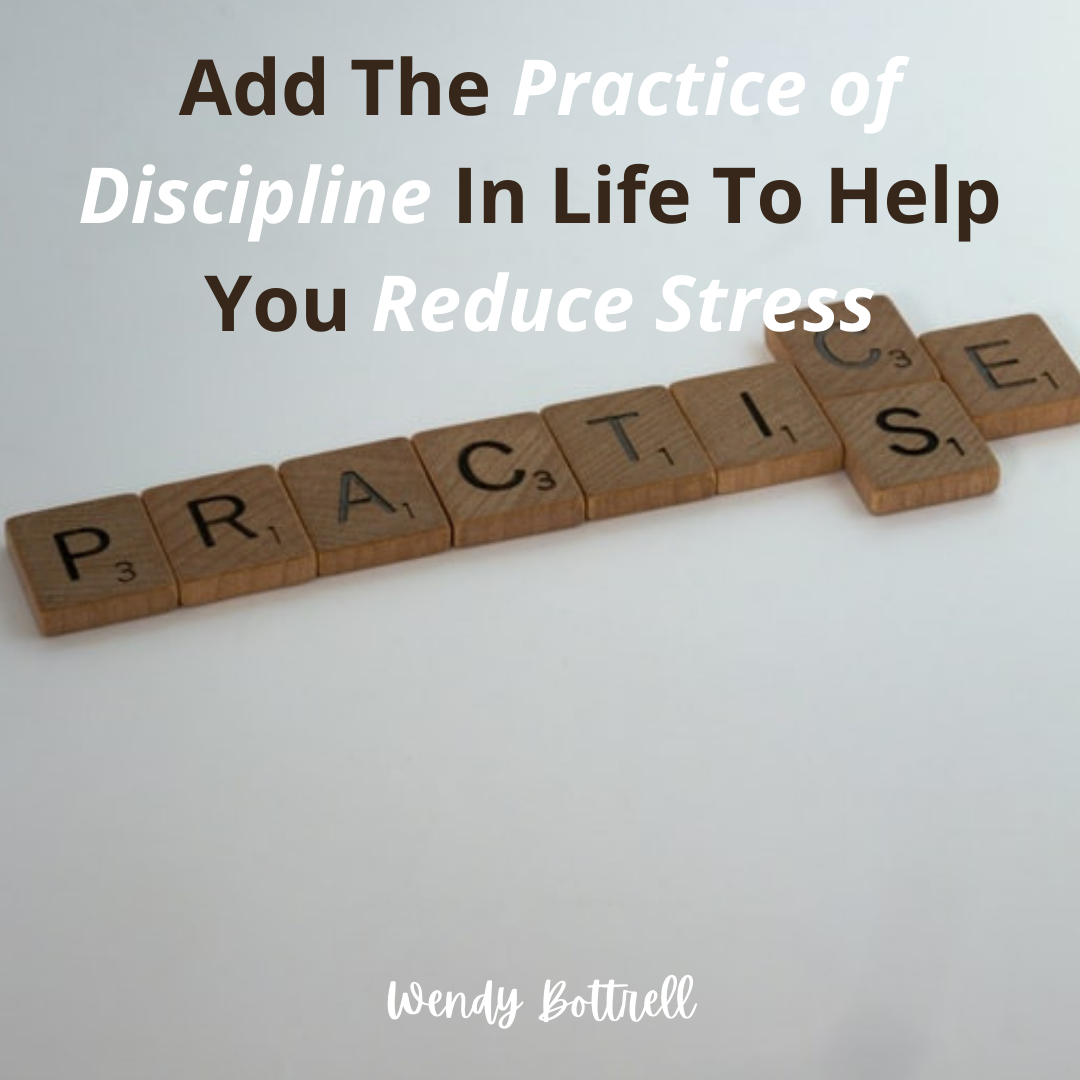 As we are coming to the end of our month where we have been discussing discipline today we would like to share our ideas to help you Add The Practice of Discipline In Life To Help You Reduce Stress. Stress is often a silent culprit that plays a big role in causing health problems to millions of people around the world. In fact, I have heard it said that 8 out of 10 visits to a primary care practitioner are due to stress. Diabetes, depression, obesity, heart disease, gastrointestinal issues and so many other health problems have all been linked to stress. Here’s what’s so amazing about it – you can fix most of these issues just by reducing your stress levels. The truth of the matter is that this is easier said than done and most people struggle to achieve it because they lack a fundamental piece of the puzzle. They lack ‘discipline’ and this is one of the MOST IMPORTANT traits to have if you wish to live a life that’s healthy, happy and rewarding. Today we’ll look at a few ways to incorporate discipline into your life and how simple actions can reduce stress and have a major impact on your mental health. • Practice Discipline With Your diet Get this one wrong and it’s almost certain that you’ll end up with health issues sooner or later. We live in an age where most people seldom give much thought to what they are eating. All that matters is that tastes good. You must be wiser than that. Discipline will ensure that you eat for fuel and not only focus on pleasure. Sure, you can treat yourself to a guilty pleasure every now and then, but for the most part, you must absolutely be focusing on real organic foods that fuel your body. If you have not been eating well this is going to take the practice of discipline for sure. One of the simplest ways to begin is to start cooking at least one meal a day in your own kitchen. We recommend picking 3 recipes that you will enjoy and learn how to cook these 3 recipes well. Real organic food recipes. Once you have your first 3 recipes down, so you have confidence with them learn 3 more. Think about a minimum of 3 new recipes a month. If you follow this practice of discipline in learning and cooking new recipes a month in 1 year you will have learned a minimum of 36 real food recipes. Imagine how much less stress you will have eating real organic food cooked in your own kitchen. The main problem here is that the majority of people make poor food decisions for 100 percent of their meals. All they focus on is how the food will make them feel. Plan out your meals 1 week ahead so that you do not have to think daily. Once you create a food plan that you can follow, stick to it. No matter what your mind tells you, you will NOT deviate from the practice of cooking at home. It’s inevitable to face resistance because you’re breaking old habits and forging new ones. Discipline will keep you focused on the plan at hand. • Practice Discipline In Your Life This one may initially sound like a difficult one to practice however what I have found is when I began this practice it has been the exact opposite over time. It has been extremely easy because with this disciplined practice I do more and feel good about getting the simple daily tasks done. Simple tasks like cleaning up after yourself will work wonders on your stress levels. Make your bed upon waking. Do your dishes the moment you finish eating. Have a laundry schedule. Keep your house and workspace tidy. Ensure that your children have a schedule to follow and keep them disciplined so that they stick to it without question. When your life has some semblance of order and sanity, your stress levels will drop. You will not have a messy house that gets on your nerves. Your workspace will not be cluttered and force you to waste time looking for things. Your kids will know what they need to do without you constantly harping away and shouting at them. It’s all these little things that matter. The problem is that many people indulge in temporary comfort and procrastination. For example, when they’re done eating, they just leave their plate in the sink because washing it is a hassle. Over time, the dishes build up and now you have a monumental task of washing all the dishes. This can be annoying and will be at the back of your mind. Quickly complete the little tasks and you’ll avoid major hassles. Discipline is doing what matters when it matters. Look at your life and simplify it as much as you can. Have a reasonable plan and schedule for everything. From your diet to the time you sleep and wake to just about everything. Follow the plan to the letter and you’ll be less stressed out. Wake up on time or slightly earlier than you need to and you’ll not have to scramble and rush to work. Plan your real organic food meals well and you’ll live with health, vitality. Discipline will reduce all the little daily microaggressions that get you down and wear you out. It may seem difficult at first to instill order and routine in your life, but once you get the hang of it, you’ll wish you had started earlier. The more disciplined you become, the easier life gets. Your turn. Share any ideas you may have on how to Add The Practice of Discipline In Life To Help You Reduce Stress Be sure to get in touch with us and let us know how we can help you. Next month our topic is - Sedentary No Longer. We are introducing a Walking Challenge and if you are interested in signing up for our Free Walking Challenge Next month register here Develop Your Discipline Skills Discipline is our topic for this month. Today we want to share ideas on Develop Your Discipline Skills By Using Health & Fitness Challenges. We began using challenges as a way to develop our skill of discipline in 2017 and it was a fun and interesting way to achieve the goal of getting out for a walk each morning. One way you can develop more discipline is to use challenges. This makes it more like a game and less like a chore. Also, there can be the element of community, connection and competition with others. There is also the benefit of accountable partners to inspire and motivate along the journey to disciplined success. Challenges are extremely popular, and you can find them in many places. Or you can make up your own and share it with a group of people. You also can make your own challenge or use one from someone else to just challenge yourself. However, you end up doing it is up to you. When looking to see if a challenge will be valuable to you, there are some factors to look for, so you can best benefit. The first thing will be is ask yourself if the challenge is realistic? You want to stretch yourself, but not to the point where you have no chance of success. For example, you could challenge yourself to lose 30 pounds in 30 days, but that is not very realistic. You also want the challenge to not be too easy. You must decide if you are willing to commit from start to finish, remembering that we are using the challenge idea to develop more discipline. Be sure to include time for learning new things, for example, if you challenge yourself to get in better shape you may want to read a book on vitality, listen to podcasts or watch a few YouTube videos. We like the idea of signing up for health and wellness summits and take time each day to watch an expert dive deep on a subject that is important to you. If the challenge is a large one over a longer period of time, are there clear-cut milestones along the way to help you have a sense of accomplishment? If your challenge, for example, is reducing 60 pounds in a year, you must set up smaller weight goals along the way so you can keep up the momentum. Milestones also help you see if you need to tweak the challenge, either lower or higher. If you reduced by 10 pounds in about 2 months, you are right on schedule, If you have only reduced by 5 pounds in that same time period, though, you may need to lower the amount you plan on reducing in a year. When you do a group challenge, you have some added benefits. There is a sense of camaraderie when working together on a goal that you do not get just competing with yourself. Other people can help you with ideas, too. For example, if you are in a group reducing weight, people can share healthy real food recipes and offer support. Just remember that the primary person you are in competition with is not the others, but yourself and you can really enjoy doing a group challenge. In 2017 I was going through a challenging life event. I decided one way to help reduce the stress was to go out for a walk each morning. So, I signed up for a walking challenge on my phone. The challenge was to walk 200,000 steps in a month. I stuck with this challenge for 13 months and in that time, I walk over 3 Million steps. It was an awesome experience. If you are interested in taking part in a walking challenge for next month to practice the skill of discipline sign up here and I will share daily guidance and inspiration with you by daily email. Share any thoughts in the comments below. Be sure to get in touch with us and let us know how we can help you. Again, if you are interested in signing up for a Free Walking Challenge Next month register here - https://forms.aweber.com/form/46/118824146.htm Effective Self-Discipline Hacks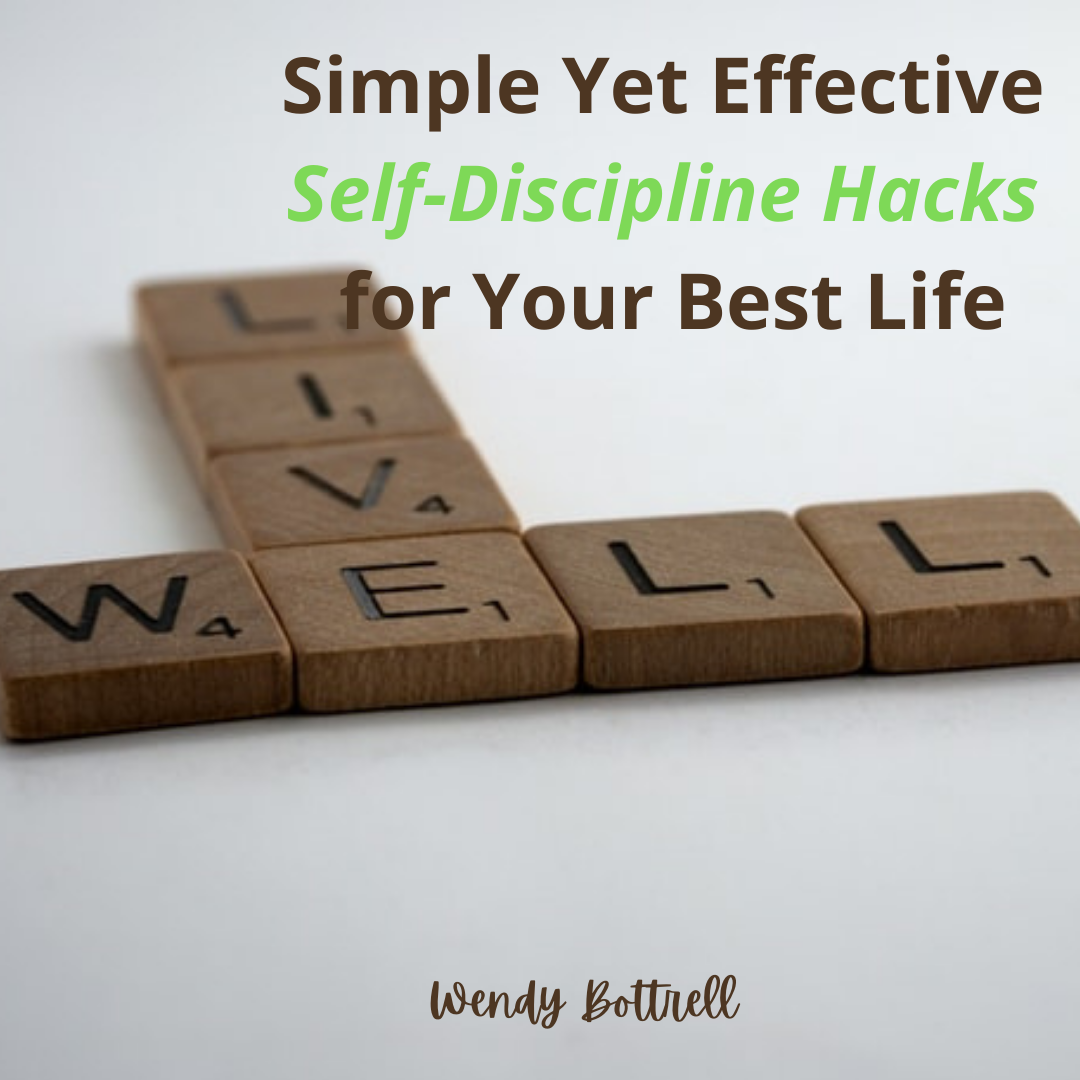 We are discussing Discipline this month and today we want to share some simple yet effective self-discipline hacks for your best life. We hear about hacking life all the time these days. In fact, just typing “life hack” into google shows about 433,000,000 results. So, let me ask you a question as we start here today. Has your life felt a little too out of control? Maybe there are too many demands on your time and resources. People at work need something now, and your mother keeps calling asking when you’re going to come to visit next. Things are coming at you from all sides, and you desperately need a way out. Believe it or not, the answer lies in something as simple as self-discipline. By taking charge of yourself, you likewise take charge of your life. Self-discipline means you’re making decisions that keep your feet on the path that you’ve chosen for yourself. And while the demands on your time might still be there, you can feel more in control. At least this is how I have experienced self-discipline in my life over this past year. Need some help getting started? Below you will find a list of some quick hacks that will set you on the road to freedom through self-discipline. 1. Pick a start date. Research has found that by setting a concrete date and putting it on your calendar, you have a higher chance of success. So chose the date and write “Freedom” in that space on your calendar. 2. Understand WHY you’re doing this. Create a list of reasons WHY you want to become more disciplined. Use that list to create affirmations and then use those often to keep yourself motivated. We have written about creating your WHY and you can find that post here - https://wendybottrell.weebly.com/blog/what-motivates-motivates - be sure to get in touch with us and let us know how we can help you. 3. Use creative visualization. Imagine yourself with self-discipline. How does that life look? How does it feel? By seeing your self-disciplined life in your mind’s eye, your brain believes it is possible. 4. Deal with temptation. If what you’re trying to use self-discipline to correct (like eating better) involves tangible objects, then remove those items. For example, get rid of the junk food in your cabinets, because the junk food will become a temptation. If it’s an intangible for example, a person you can’t say no to, then write a script of how you’d like that particular conversation to go. That way you already have the words to say no when you need them. The important idea is to practice dealing with the temptation. Just saying NO to either a tangible or intangible. 5. Grab a snack. Eating a real food organic diet can be a super important way to avoid making poor choices around snacking. Be prepared, have better snacks easily available. Make sure to be hydrated. Sometimes we make poor snack choices because we are thirsty rather than being hungry. To get around this if you are looking to snack is to have a glass of water and wait twenty minutes. If you still feel hungry go ahead and have a healthy real food snack. Enjoy. 6. Find your self-discipline tribe. By surrounding yourself with self-disciplined people, you create for yourself a support group as you set forth on your journey. Sometimes all it takes is someone to mentor you through the rough spots. Don’t kid yourself, becoming self-disciplined takes practice. But you can make it a lot easier for yourself if you set yourself up for success from the start. Remember who you’re doing this for (you!), and you’ve already won half the battle. So, there you have it. A few simple yet effective self-discipline hacks for your best life. The challenge if you accept it is to pick one of the simple hacks and begin practicing today. Be sure to let us know what self-discipline hack you will begin practicing the comments below. Get in touch with us and let us know how we can help you. We invite you to subscribe to our newsletter here A Disciplined Approach To Fitness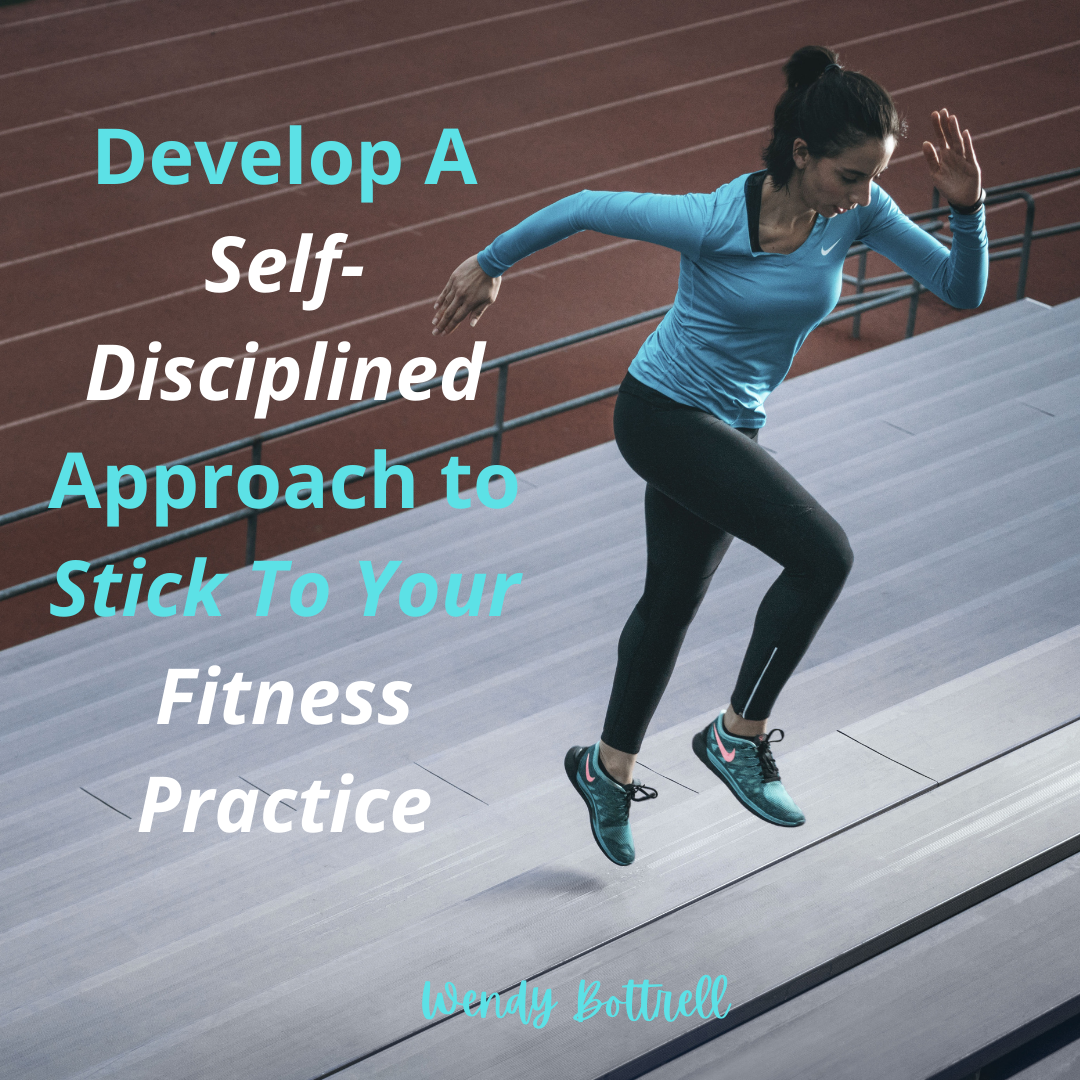 We are well into 2021 and today we want to share ideas to help you develop a self-discipline approach to stick to your fitness practice. We know that every January comes with a sense of renewal for many people. A common theme amongst individuals is to create a resolution involving things they would like to change or achieve in the coming 365 days. One of the more common resolutions involves fitness. Whether it be to simply improve overall physical appearance, get healthier or maybe just become stronger, a vast amount of people base their resolutions around some facet of physical fitness. Unfortunately, the majority of New Year’s resolutions fail. The fiery motivation felt in late December to mid-January begins to wane and by February, people find themselves at the same place they were the year before. Fitness goals are prone to not being fulfilled. If you’ve ever spent much time in a gym, you know the routine. For the entire month of January, there is often a line at every piece of equipment in the building. The local fitness facility begins to resemble Times Square. Where are you right now with your fitness? Do you have a regular and consistent workout schedule? If so congrats. If you have been struggling to develop a self-disciplined fitness practice there is no better time than right now to begin. Begin moving well each day. If you can set yourself apart from the statistics, you will undoubtedly thank yourself next December when you are revelling in your progress while others are starting the typical, “maybe next year” routine! Here are a few simple ideas to help you develop a self-disciplined approach to stick to your fitness practice. 1. Keep Things Simple When planning a fitness practice it is so easy to become overwhelmed. Contemplating which workout routine to start, what foods to eat, even the outfit to wear to the gym can get in the way of your overall goal. Fitness, as well as life in general, is best kept simple. The best workout routine is the one you will stick to, period. Similarly, your nutrition must not be rocket science. You know what foods are good for you and what is junk. The biggest determining factor pertaining to your success in fitness is consistency. Begin here with moving well each day, whether that means walking, lifting weights or yoga. 2. Set Reasonable Goals The media does a remarkable job of making drastic body transformations seem like an overnight process. We are constantly bombarded with images and television commercials promising that if you buy their equipment or take a certain supplement, you will look identical to the models used to promote these products. Even more comical is the timeframes reported by these advertisements. How many times have you heard, “In just 15 minutes per day, 3 times per week, you will finally have those six-pack abs?” This is all nonsense, as physical changes to your physique do not work this way. Fitness is about creating a lifestyle practice for the long game. As you begin your journey, it is critical to realize that while you WILL see progress, it doesn’t happen overnight. Therefore, instead of planning on going to the gym 7 days per week and eating nothing but rice and chicken from a Tupperware container, set goals that you can stick to. Start small, like holding yourself accountable to 3 workouts per week and avoiding your favourite late-night junk food. 3. Develop A Strong “Why” We write about developing a strong WHY a lot. Here is one of our WHY posts for you to check out. It is important to create YOUR WHY. As we have already discussed, fitness is about consistency. Remember this, the incredible sense of motivation and enthusiasm you feel at the start WILL come and go. If your only goal to work out is to “look better,” there are going to be a lot of days in which that is simply not enough. If you are going to stick to your fitness goals this year, developing a reason WHY that is strong enough to stick it out when the motivation cools off, the excitement isn’t there and you’d much rather stay in and watch television instead is MANDATORY. Your “WHY” has to be unique to you. Find whatever that is and use it to push through the hard days! We wrote about Discipline and Motivation here https://wendybottrell.weebly.com/blog/5-disciplined-ways-to-stay-motivated-no-matter-what-for-your-best-life be sure to check it out. I was able to develop my WHY way back in 1997 when my mother had a fall and broke her hip, needing a full hip replacement. I knew at that moment if I didn't make big changes to my life I was going to be my mother in 20-years. You see I was 100 lbs heavier, out of shape, and in poor health. Bad eating habits, no exercise and a lifestyle where I was struggling each day. The WHY I created that night is still my discipline and motivation for the health and fitness lifestyle I continue to live today. 100 lbs lighter and in good health because of my WHY. I feel great, and enjoy life today knowing the value of creating a strong and clear WHY. Let us know any thoughts and ideas in the comments below. Be sure to get in touch with us and let us know how we can help you. Subscribe to our newsletter here Disciplined Ways to Stay Motivated We are discussing discipline this month and today I have some ideas on motivation. Our topic today is 5 Disciplined Ways to Stay Motivated No Matter What For Your Best Life and it got me thinking if our motivation is directly connected to our discipline. Before I share my ideas I went and found an article that I feel adds to this conversation and it is titled - Which Is Better: Discipline or Motivation? "These are new and exciting findings. We used to regard self-discipline as a tool to become more motivated. Now, we see that strong self-discipline influences how motivated the athletes are," Jordalen says. Jordalen also found that the athletes were more prone to burnout if they were driven by extrinsic motivation. "Showing restraint and being disciplined can be more draining if motivation is fueled by extrinsic factors. This would increase the risk of ending up feeling exhausted and being burned out. If the athletes are driven by intrinsic motivation, it is easier to resist things that would negatively affect their daily schedule. This way, the athletes keep their training in check," says Jordalen. In my experience, motivation is what's needed to get up-and-running. But, discipline is needed to stay on the right course. In short, you need both factors to be successful. Here is the source for this article - So, let me ask you a question before we begin. Do you ever find yourself losing motivation? It happens to the best of us, right? But there are ideas to staying motivated, many of which involve going back to the beginning which is looking at your WHY and at your goals. With some disciplined preparation and clarity in your planning, there’s no reason why you won’t stay motivated all the way through whatever project you’ve set out for yourself. How? 1. Start with the big picture. What is it you want to accomplish? Having an idea of the outcome of your goal will keep you to stay on track. The clearer the vision (Your WHY), the more likely you are to keep going, even when times get tough. Ask yourself what it is you want to achieve – and then visualize yourself achieving it. The visualization step is an important one here. We tend to perform in the way we expect to. So, if we are not clear on our outcome, we simply don’t get there. By seeing success, you’re more likely to attain success. We wrote a post that will help you clarify your WHY here 2. Now that you’ve gotten the big picture make sure this is YOUR goal. At first glance that statement seems ridiculous – why would you make a goal that isn’t your own? This answer can be found most easily in asking WHY you want to accomplish what you are. If the word “should” comes up, then chances are you might want to re-evaluate what you’re doing. We often set goals because we feel like they’re something we’re supposed to do, and not because they’re something we want to do. You’re less likely to stay motivated when you’re on the path of ‘should.’ 3. Next, you’ll want to break those tasks down into something manageable. Now that you have a goal and are sure it’s something you want to do, you might feel a little overwhelmed about how you’re going to accomplish that goal. By breaking it up into smaller pieces, you regain the feeling that you’re doing something possible. Like a pro tip? Celebrate the small successes then as you go. We call this taking the WIN as they come. That will help keep the motivation levels high. As you begin this practice it will take self-discipline to do this. Go ahead and enjoy each WIN along your journey. 4. If you’re still a little overwhelmed, get organized. It might be that you don’t feel prepared to work on this project because you lack the research or supplies. Figure out what you need, and then go about making sure you have the proper tools to get the job done. This is where the practice of discipline is important, so you are staying on track and moving forward. Sometimes we tell ourselves we don’t have the right supplies or must do more “research” before we begin. There is no question that it’s easier to stay motivated when you have what you need to succeed. 5. If all else fails, remember WHY you set the goal in the first place. It could be you will want to practice self-discipline at this point in your journey Look at your previous successes to find the fresh motivation to keep going. Motivation isn’t something you have to lose as you work on a project. You can keep your self-discipline and motivation levels high with a little forethought and planning. By keeping on track with your goals, you’ll find that motivation will likewise keep on track, guiding you all the way through the job at hand until completion. Practicing the skill of discipline and motivation will keep you on track to see your goals to the end. We have found this to be true for us and we teach/coach our clients to experience this in their journey. Share any thoughts in the comments below. Our holistic lifestyle one-on-one coaching packages will help you learn how to clarify your health and fitness goals, develop the skill of discipline so you will stay motivated and inspired in all that you design for your life with a heart full of joy along your journey. Be sure to get in touch with us and let us know how we can help you. We invite you to subscribe to our newsletter here Learn Self-Discipline With An Accountability Partner Today as we continue to discuss discipline, we are sharing ideas to help you learn how to improve your self-discipline with an accountability partner. Many people think self-discipline means doing it all on your own, but it does not mean that at all. In fact, having a coach, or a group, or an accountability partner can really help you to develop more discipline. An example would be when someone puts off housework until they know someone is coming over, and they race around to get the house all tidy before their visitor arrives. It is far easier to give in and be less disciplined when you just have yourself in the picture. When you have a person or people hold you accountable though, you are far more likely to make sure it happens. Your coach or partner helps you stay on track and ultimately this helps achieve your desired outcomes and in our experience do this with far less stress and more joy! An accountability partner is someone you set up an agreement with to hold each other accountable for reaching goals. This is a mutual pact and is probably the easiest to set up. The goals do not have to be the same ones, the point is to connect on a regular basis, often once a week, and share with each other how much you have accomplished. The best way to do this is to break up the task into daily tasks. Do each one each day so that you are not rushing to finish up the project the night before you meet with your accountability partner. We have found that it is often easier to schedule a meeting with one other person than a group of people. You also usually do not have to pay for this method, and most masterminds and coaches are paid programs. You also have more flexibility in how you meet with an accountability partner. You can just call them on the phone, or use an instant messaging program, or you could meet for lunch once a week at a restaurant, or at your house. You may prefer joining a group like a mastermind instead of just a one-on-one accountability partner. The advantage to having a group is additional pressure on you not to let the whole group down, and the fact when you run across an obstacle, the group can help brainstorm ideas to help you out. Two heads may be better than one, but sometimes multiple heads are much better than just two. You may find that you want some one-on-one coaching, or small group coaching instead, to keep you accountable. Maybe you are working on something new and need teaching as well as the connection. Personal coaching tends to be the most expensive option since you are taking up a lot of the time of your coach. Group coaching is becoming far more available because it allows the coach to help more people at the same time, plus gives the advantage of having other people that can help you out with specific issues, like a mastermind. They also usually cost a lot less than one on one coaching so maybe more in your budget. Whatever method or methods you use, remember you still have to practice your discipline skills for them to work. We believe it is worth developing the skill of self-discipline. We have a variety of coaching options and here is our link to have a look and see if we can help you. Share any thoughts and comments below. Be sure to get in touch with us and let us know how we can help you. Subscribe to our newsletter - https://mailchi.mp/d44da570a49b/newslettercontent Self-Discipline and Trust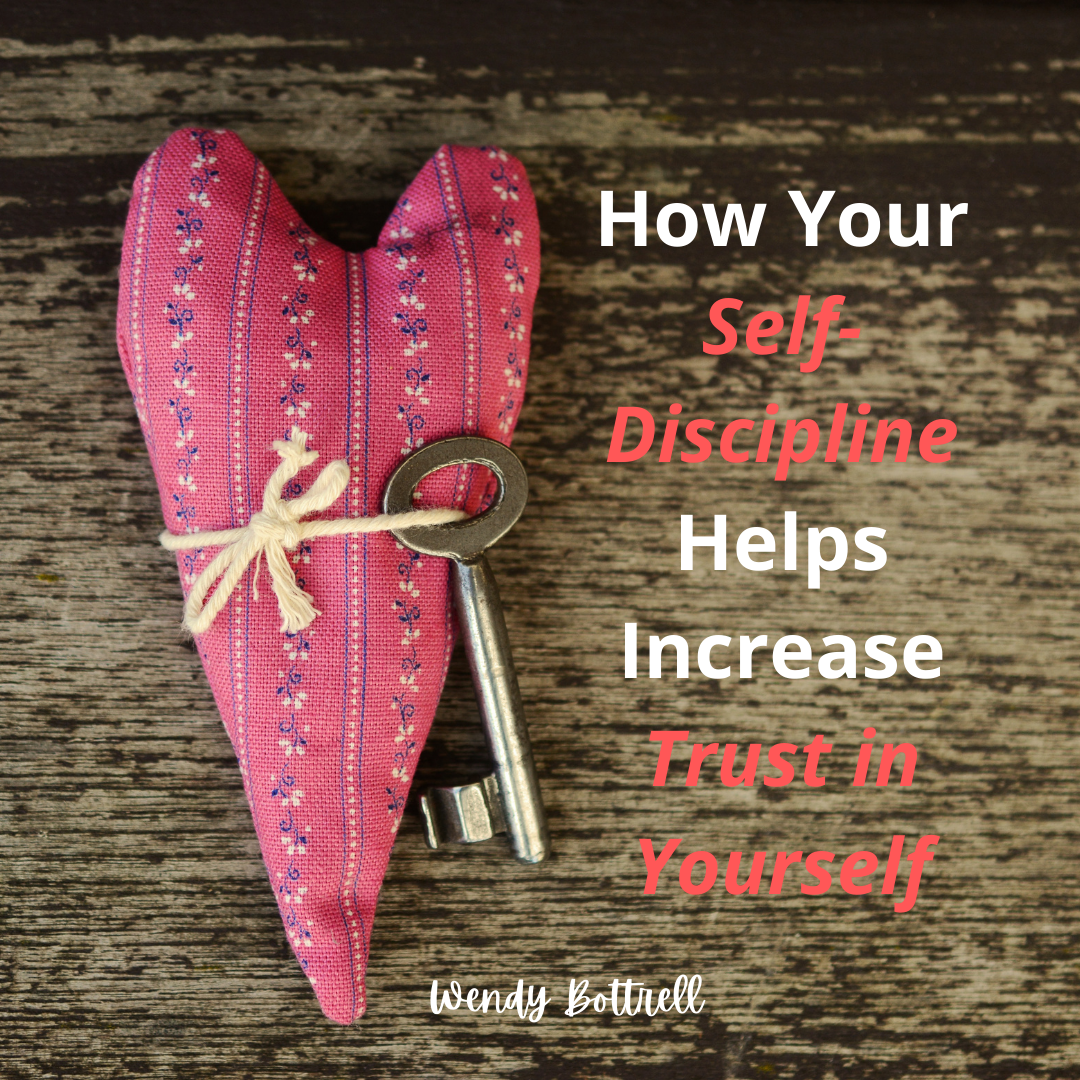 As we continue to share ideas on discipline today we are going to include the idea of how your self-discipline helps Increase trust in yourself. We began this topic with a definition of discipline here is the reminder - Definition - “Self-discipline is the ability to control yourself and to make yourself work hard or behave in a particular way without needing anyone else to tell you what to do. Exercising at home alone requires a tremendous amount of self-discipline.” (source) - and the link to that post is here Now let’s look at how trust is defined. “Trust is a feeling that somebody or something can be relied upon or will turn out to be good. It is the feeling of being sure about something, even if it cannot be proved.” - (source) You may have a difficult time trusting yourself. Don’t despair. You are not alone. It is something that many people experience and finds difficult to overcome. When you lose trust in others, you start to lose trust in yourself. Meaning if we can’t rely on someone or we don’t trust that things will work out for us we might struggle in life. To help you overcome this challenge, you must begin to focus on key aspects of trust. The first is to rely on your accomplishments no matter how big or small. If you pass off your accomplishments as not being that important, when you need to rely on them, they won’t be there for you. That is sure to interrupt the process of trusting yourself. From my experience a big part of the trusting ourselves process is having the self-discipline to focus on the WINS no matter what. You also must trust your instincts. Now, understand that this does take practice in self-discipline to trust your instincts. You won’t always be right, but you will be more often than not. An instinct is something you feel strongly about and does not come only from experiences. They come from something internal that no one can truly explain. It’s part of that inner voice that is telling you what to do. You must only listen. How many times have you said to yourself that you "should" have listened to your instincts? Allow yourself to rely on other people. If you open yourself up to letting others into your life, you will find that you become more trusting of yourself. Whether you like it or not, we must allow other people in, that is a part of the human experience. You can’t know everything there is to know about every subject. Use the strengths of others to supplement what you know. It will take the burden away from you to do everything. That will help open the possibilities to put trust in yourself. Begin to filter out negative information. You get bombarded with this throughout your life. It occurs every day in the news, at work, and in many cases, your home. The more you practice being self-disciplined on positivity in your life, the easier it will be to trust yourself. A good first step towards this goal is to avoid negative people. They work hard to try to bring you down. Trusting yourself sometimes requires a leap of faith. Make self-disciplined decisions rather than take unnecessary emotional chances. While you want to be smart regarding the risks of your decision, you don’t want to overanalyze every decision you make. If you do, you will never make any decisions, and you will become exhausted with what is called decision fatigue and ultimately become stagnate from not taking action. It’s true that not everything will work out the way you plan. However, you will never know unless you do. The good news is when you are ready to take action, many of your decisions will work for you because you have created a system of self-discipline and trust for your best life. Self-discipline and trust in our opinion go hand in hand. We must practice these skills daily. Wendy has mastered the skills of self-discipline and trust over many years. I help women who have struggled with their own health and fitness for years to develop and implement the necessary skills to begin to see their desired results. Better health, moving well. Share any thoughts in the comments below. Be sure to get in touch with us and let us know how we can help you. Subscribe to our newsletter here https://mailchi.mp/d44da570a49b/newslettercontent Self-Discipline Empowers As we continue to share ideas on the topic of disciplined life today, we have some ideas to help you learn why self-discipline empowers you for your best life. This has been the most important lesson we have learned for ourselves over the past year. As you know 2020 and now into the early months of 2021 have been challenging. My self-discipline practices have made this year less stressful. Here is why. Now, you may think that developing discipline is about limitations. This thought has probably been reinforced by previous attempts at changing any bad habits. In my opinion, it can be very empowering to develop a disciplined mindset. Think back to when you managed to make a change in behaviour that was successful, how did you feel? When you overcome obstacles in your path and accomplish something with consistent work, you feel like you can do anything. We like to call this getting the WIN. Winning is awesome and when it helps us grow and become a better human that takes like to a new level of success. Conversely, when you are not self-disciplined, you often do not accomplish your goals and feel like you are not worthwhile. You tend to put yourself down more and in general, have a more negative outlook on life. This may set you up for health issues, in particular those related to obesity, or have trouble in your relationships with friends and family. Successful people do not get there just because of luck. They make goals, plan how to achieve them, and then develop the discipline to accomplish those goals and plans. They do fail, they do have obstacles, they may even modify the goals or go in a different direction based on working on those original plans. If you want to grow in life, you must develop the practice of self-discipline. You may want to get rid of bad habits like smoking, not eating well, or maybe overeating and not exercising. You may want to form good habits such as exercising, reducing clutter, reading more books, watching less television, or saving money. You can accomplish these habit changes if you focus on one or two at a time and consistently act on those goals over time. One is best, though if you are trying to get healthier, move better, lose weight for example. Now many people think that if they combine eating and exercise this will help them move forward and it is my experience that this doesn’t work for most people. I suggest that you simply start with an exercise plan that you know you can do consistently and will enjoy it. Stick with this for 3 months at least 3 times a week. Don’t even change how you eat. Just enjoy getting moving more and you will be surprised by the WINS you will begin to see. At the 3-month mark of your exercise practice, then begin to eat more real organic food cooked in your own kitchen. Always remember that the biggest obstacle to discipline is not a lack of willpower, but a desire for instant gratification. Especially in modern society, everything seems to be focused on having things done quickly. People eat instant oatmeal or cold cereal instead of having a cooked breakfast. You grab a burger at a fast-food restaurant instead of bringing a healthy lunch to work. Television commercials tell you that you can have this or that right now if you pay by credit card. The problem with that of course is the interest you later have to pay on those purchases. You can improve things where you are not in debt, are healthy and fit, and have stable relationships, however, it will require giving up instant gratification, and adopting a self-discipline mindset. It will not always be easy, but you will find it quite empowering to achieve your goals for your best life. We shared ideas on 7 Simple Ways To Master Self-Discipline For Your Best Healthy Life if you are looking for a roadmap to help you begin. https://wendybottrell.weebly.com/blog/7-simple-ways-to-master-self-discipline-for-your-best-healthy-life Share any thoughts or comments below. Be sure to get in touch with us and let us know how we can help you. We invite you to subscribe to our newsletter here https://mailchi.mp/d44da570a49b/newslettercontent Self-Discipline TraitsWe continue to share ideas about discipline and today our topic is Does The Self-Discipline Person Practice These 10 Specific Traits? We say yes!
We believe that when someone is referred to as self-disciplined, it means that they’re essentially inspired enough to avoid short-term temptations to achieve long-term goals. They tend to be the person everyone else can count on to get things done. They are exceptionally reliable people who are often very successful. They are people with integrity. 10 Traits of the self-disciplined person: 1.Take Personal Responsibility for Your Actions – To demonstrate self-discipline, at its core it’s all about realizing you are responsible for your own actions and no one else’s. When things go right or wrong, you look at how your own behaviour affected the situation and then note what you’ll do again and how you can do better next time. 2. Believe You Are Responsible for Yourself – A person with strong self-discipline doesn’t usually need outside influence to do the right thing. They are very sure of their core values and will put them ahead of what they "want" and do what is right. 3. Understand Your Own Potential – People who have strong self-discipline tend to realize that they have a lot more power than the average person thinks they have. Due to this, they set up their lives in a way that will lead them to succeed because they know they can do it. 4. Know How to Set Goals Properly – When you know that your actions make a great deal of difference to your success, you’ll place a high level of importance on learning how to set goals properly. Learn about SMART goals so that you can set yourself up for success. We made a video Behavior-Based Approach to Goal Setting and Goal Achieving https://youtu.be/ELOqFZPb-fc for you. 5. Set Schedules and Routines for Daily Life – Everyone is handed the same 24 hours in a day. The way highly successful people use that time is the only difference. They tend to schedule everything and do things at certain times ritualistically because it helps them do more in their lives and experience more balance. The course I highly recommend is Mindful Time Management for Joyful Productivity From George Kao https://bit.ly/33enRE3 George has helped me get more organized with my time, set schedules that make sense for me and do it all with joyful productivity. A game-changer. 6. Feel Grateful Every Day – Looking on the bright side is a trait of people who have self-confidence because they tend to believe in their life and the world around them. Keeping a gratitude journal can help anyone learn to feel more grateful. 7. Are a Lifelong Learner – Sadly, most of the world doesn’t read after they’re finished with school. But a person who has self-discipline is usually a lifetime learner. They like reading and learning and always make time for it. 8. Take Care of Your Entire Self – The reason self-discipline helps you take care of yourself is that you’re able to see how some hard decisions made today (such as not having that piece of cake) will pay off tomorrow and for your lifetime. 9. Are Confident, Patient and Calm – Because you don’t feel powerless, and because you know how to make goals and plans to reach those goals, you can feel a lot more confident, patient, and calm. There is no reason to get into anyone’s drama and even when things are tough, you know you’ll make it through if you follow the steps and your schedule. 10. Forgive Yourself and Others for Their Imperfections – Since you constantly work on yourself, you realize that no one is perfect and that it’s okay. Human imperfections are what make everyone interesting. The most important thing to realize about self-discipline is that you don’t have to be perfect from day one. If you want to improve your chances of experiencing success, working on your self-discipline is the key to that success. We help women develop their self-discipline muscle with our coaching plans. Learning how to develop the skill of discipline a habit that l I have learned over years. We coach our clients to develop their WHY clarity, set meaninful goals, take the necessary actions to go from where they are to where they actually want to be. You can learn more about our coaching here Your turn. Share any thoughts or ideas in the comments below. Be sure to get in touch with us and let us know how we can help you. We invite you to subscribe to our newsletter here: https://mailchi.mp/d44da570a49b/newslettercontent Make Disciplined Change In Bite-Size Steps As we continue to discuss discipline this month today, we want to share some ideas to help you practice discipline in bite-sized steps for your best life. You see we like the idea of bite-size change or tiny steps to change. It is far less overwhelming for you and we feel there is a better opportunity to WIN with this practice. Find out more about celebrating your WINS every day here: https://wendybottrell.weebly.com/blog/daily-intentional-habits As we see it, one of the ways that people struggle with developing self-discipline is trying to make too many changes at once. Not just by doing more than one goal at a time, but by making those goals way too large. Either of these approaches tends to lead to failure. And we don’t believe that anyone truly wants to fail, right? An example of too many goals at once might be someone choosing to quit smoking, go on a diet, exercise regularly, build a successful business, and get out of debt. All of these are excellent goals that can be done. If you try to do them all at once, though, you will probably find it to be too much and quit. This is one of the reasons why resolutions rarely work out. Instead, focus on one or two of these for at least 1 to 2 months and make them consistently a new habit first, before tackling new goals. We wrote about small daily habits week after week here: https://wendybottrell.weebly.com/blog/change-your-life-with-small-daily-habits-week-after-week For example, take quitting smoking, you might start with that one since it has the most negative impact both on health and finances. So you might start with just quitting smoking. You could spend a couple of months getting rid of the cigarettes and using aids like the nicotine patch to help. Then once you have completely quit smoking and no longer need the patch, you can move on to the next goal or goals on your list. You may find changing your diet and exercising more to be really overwhelming goals because they are huge ones. So, another tactic to help you with discipline is to break them down into smaller goals. Instead of just quitting overeating, maybe you break it down into this week you cut your soda intake in half, then in week two, you cut it out completely. If you do this week by week making one SMALL change, you may find it easier to stay in control and ultimately get the WIN. Another way you can break it down is by intensity. So say you want to exercise more, but you have not exercised in years. If you start with something like a full workout, you may give up or get injured and then be unable to exercise at all. So instead of going full tilt, you may want to start with simply getting out for a walk or you can start by doing mini resistance workouts at a lower intensity for a few weeks, and over time add more minutes to your workout until you reach your goal of at least 20 to 30 minutes of activity. You can also over time increase the intensity of your workout as you get stronger and in better shape. By breaking down the goals into bite-sized steps, you can make it easier to develop the discipline you need to accomplish them. You will also improve the chances of success in changing your habits. Share any ideas in the comments below. Be sure to get in touch with us and let us know how we can help you. Subscribe to our newsletter https://mailchi.mp/d44da570a49b/newslettercontent Self-Discipline and MindsetDiscipline is our topic this month and today we will share ideas on the question does your mindset influence self-discipline? Yes! Here is Why. Be sure to let us know your thoughts in the comments below.
According to Stanford University psychologist, researcher and author, Carol S. Dweck, there are two kinds of people in this world – those with a fixed mindset, and those with a growth mindset. This article explores how your mindset influences self-discipline. What’s The Difference Between Fixed & Growth Mindsets? People with fixed mindsets believe their characteristics, traits, and skillsets are permanent and, therefore, cannot be changed. They are more likely to attribute success to natural talent and feel attached to – and proud of – their current level of brilliance, skill, or brainpower, rather than seeking to improve through hard work and focus. People with growth mindsets, conversely, assume that talent, skill, and intelligence are changeable and can grow with practice, learning, and hard work. They acknowledge that wherever they stand, they can always improve. As such, they view success as attainable regardless of the starting point. No goal is too big. A Fixed Mindset Is The Enemy Of Self-Discipline If you follow Dweck’s model, it’s easy to see how a fixed mindset is the enemy of self-discipline. Let’s say, for example, that you want to lose weight. Maybe you compare yourself to a very slim or physically fit friend. What if you hear this friend say things such as “I’ve always been small,” “I have a fast metabolism,” and “No matter what I do, I just can’t seem to gain weight!” This person seems to eat and drink whatever they want, never exercise (as far as you know) and look fantastic. While you, on the other hand, can’t seem to lose weight no matter what. You conclude that you “just have a slow metabolism,” “accept that you’re probably not meant to be any smaller,” and believe it’s outside your power to make the change you desire. The truth is that your fixed beliefs are holding you back from reaching your goals, nothing more. Your fixed mindset steals your power. It puts distance between you and the big idea that although it may take a bit more effort than you’re accustomed to, you can change. It's all about perspective. More often than not, people who’ve achieved results you only dream of have generally put in much more work and effort behind the scenes than is evident on the outside. They just don’t talk about it. Think about “overnight celebrity.” Tales of people who seemingly come out of nowhere to instant stardom. You’ve never heard of them before, then suddenly you see them everywhere and they make it look so easy. Yet, when you look into their past, you find that they’ve been working extremely hard for years, finally had a big break, and now are reaping the benefits of the seeds they’d sewn years before. A fixed mindset is closed to ideas of hard work, patience, determination, persistence, trial and error, and learning as you go. Yet, these are the very traits that self-discipline is all about. A Growth Mindset Makes Self-Discipline Inevitable Just as a fixed mindset is the enemy of self-discipline, a growth mindset supercharges self-discipline and positions it as the top tool in your goal-setting toolbox. Let’s return to our example of weight loss, assuming a growth mindset this time. What changes? Well, first of all, you acknowledge that you may have struggled with your weight in the past, but you decide that it has no bearing on your future. You know you can change. If you do think you “have a slow metabolism,” rather than assume it’s preventing you from losing weight, you’ll go to the doctor, have some tests run, and gain concrete evidence of such along with recommendations for how to improve. Furthermore, you educate yourself on healthy, sustainable weight loss methods, taking your lifestyle, preferences and limitations into consideration. You understand that the process may take some time, and it won’t always be fun, yet you’re aware of why you want to lose weight in the first place, commit to the goal and believe that with time, focus and determination, you can make it happen. Which Mindset Do You Have? In Mindset: The New Psychology Of Success, Dweck explains that it’s common to have a fixed mindset in some areas and a growth mindset in others. If you’re naturally introverted and more on the shy side, you may have low confidence in social situations. Yet a growth mindset may push you to step outside your comfort zone and go to events where you’ll meet new people and try new things. On the other hand, since you’ve always been shy, perhaps you spent lots of time reading books and studying as a younger person, thus effortlessly achieving academic success. You may consider yourself “naturally smart” and have a fixed mindset in this area. You Can Change Your Mindset One of the first steps to improve your self-discipline is to become self-aware. If you analyze your personality and find that you have a fixed mindset, know that you can change. Dweck explains, “Mindsets are just beliefs. They're powerful beliefs, but they're just something in your mind, and you can change your mind.” Share any thoughts in the comments below. Be sure to get in touch with us and let us know how we can help you. Subscribe to our newsletter here https://mailchi.mp/d44da570a49b/newslettercontent Master Self-DisciplineAs we continue to share ideas on the topic of discipline today we are sharing 7 Simple Ways To Master Self-Discipline For Your Best Healthy Life.
How often have you waited until the first of the week, month, or even year to declare you’re making sweeping life changes, only to fall back into old, familiar patterns just a short while later? If the answer is “plenty,” you’re not alone. New year’s resolutions wouldn’t be such a big deal, otherwise. The good news is that you can get off this pesky rollercoaster of ups and downs, and get your feet on the solid ground of steady progress. All you need is self-discipline. 1- Start With Why You may think self-discipline starts with to-do lists, apps, calendars and planners, but that’s not the first thing you need. The first thing you need to master self-discipline is to know why you’ve chosen your goals. The thing is, superficial reasons often aren’t strong enough to make this stick. You need to identify the deep, emotional causes that resonate in meaningful ways. For example, losing weight just for the sake of being slimmer likely isn’t strong enough to keep you on your diet or in the gym every day. However, when you think about the more significant outcome of losing weight, the pull gets stronger. Is the goal of weight loss to have more self-confidence? To have more energy to spend with your children? Do you want to live longer and eliminate or avoid illness? 2- Delay Gratification (But Lock It In) Second, one of the more significant concepts behind self-discipline is that you increase your ability to delay gratification. When weighing opposing options, you sacrifice short-term benefits for long-term gains. The best way to build self-discipline is to delay gratification, but make sure you plan something enjoyable in the short-term too. For example, if you’re trying to lose weight and you must choose what to eat, you may compromise by following your diet plan correctly all week and allowing a break or cheat meal on the weekend. Or you allow yourself some of the foods you enjoy, stipulating that you prepare them yourself with lighter, healthier ingredients. The key is to make choices that lead to long-term benefit without completely sacrificing your quality of life in the short-term. That way, you make sustainable changes that you can stick to. 3- Reduce Your Options The third method of mastering self-discipline is to simplify your life by reducing your options. Many successful people in the media, such as Barack Obama and Mark Zuckerburg, are known for doing so with their wardrobes – they wear the same types of clothes every day, thereby eliminating confusion on what to wear. You can do the same thing with your diet by stocking your fridge and cabinets with only healthy foods. Remove the temptation to go off plan. When you sit down to work, clean your workspace of anything you don’t need to finish your job. Only make necessities available to you. 4- Visualize The Process Another method that works for building self-discipline is visualizing the steps you’ll take to achieve your goals. If you tend to struggle with waking up early to go to the gym, for example, before you fall asleep at night, envision how you’ll approach the morning. Picture yourself waking up right when your alarm goes off, getting dressed, and heading straight to the gym. Imagine the exact workout you’ll do from start to finish and visualize yourself feeling accomplished, knowing you’ve made the best decision and gotten a great start to your day. 5- Meet Your Baseline Needs It’s much easier to build new habits and exert self-control when you are well-fed, well-rested, hydrated, relaxed, and comfortable in your physical surroundings. As such, make sure you meet your basic needs of healthy food, shelter, drinking enough water, and getting enough rest before you tackle big goals. 6- Change Your Language Next, the way you speak about your goals and priorities can make a huge difference in your approach. If you’re starting a new business, for example, not every aspect will be exciting and motivating. Some things will feel tedious, dull and even downright frustrating. Exercising self-discipline and self-control means pushing through the unpleasant parts to reach your end goal. A trick you can use here is to change the way you discuss these aspects. For example, if you’re dreading a presentation or project at work or school, you have two choices. You can complain about how awful the job is and procrastinate. Or, you can describe how lucky you are to be in your position. If it’s for school, you can think about how fortunate you are to get the chance to advance your education. If it’s for work, you can think of how you get to showcase your knowledge or skills and how great it is that you have a steady paycheck coming in that allows you to pay your bills and enjoy an amount of security in your life. 7- Shift Your Identity Finally, your self-discipline will be much improved if you think of the end goal and align your identity with the type of person who has achieved what you seek. For example, if you want to improve your physical fitness, consider the actions of the physically fit. Reframe your identity and describe yourself as the type of person who cooks healthy food and enjoys physical activity. If you want to have a successful business, examine the traits of successful businesspeople. Adopt some of those traits as you describe your identity. Perhaps you’ve read that the most successful people are early risers. You, too, can shift your self-perception by becoming an early riser. Identify as the type of person who wakes early to work on their business every day. Self-discipline is a combination of identifying your goals and shifting your mindset to prioritize the choices that inch you further toward attaining them, despite your feelings. However, self-control isn’t something you can master overnight. Just like any muscle in your body, self-discipline takes time to build. With practice and effort, you can improve, grow, and become the best version of yourself possible. Share comments below. Be sure to get in touch with us and let us know how we can help you. Subscribe to our newsletter here 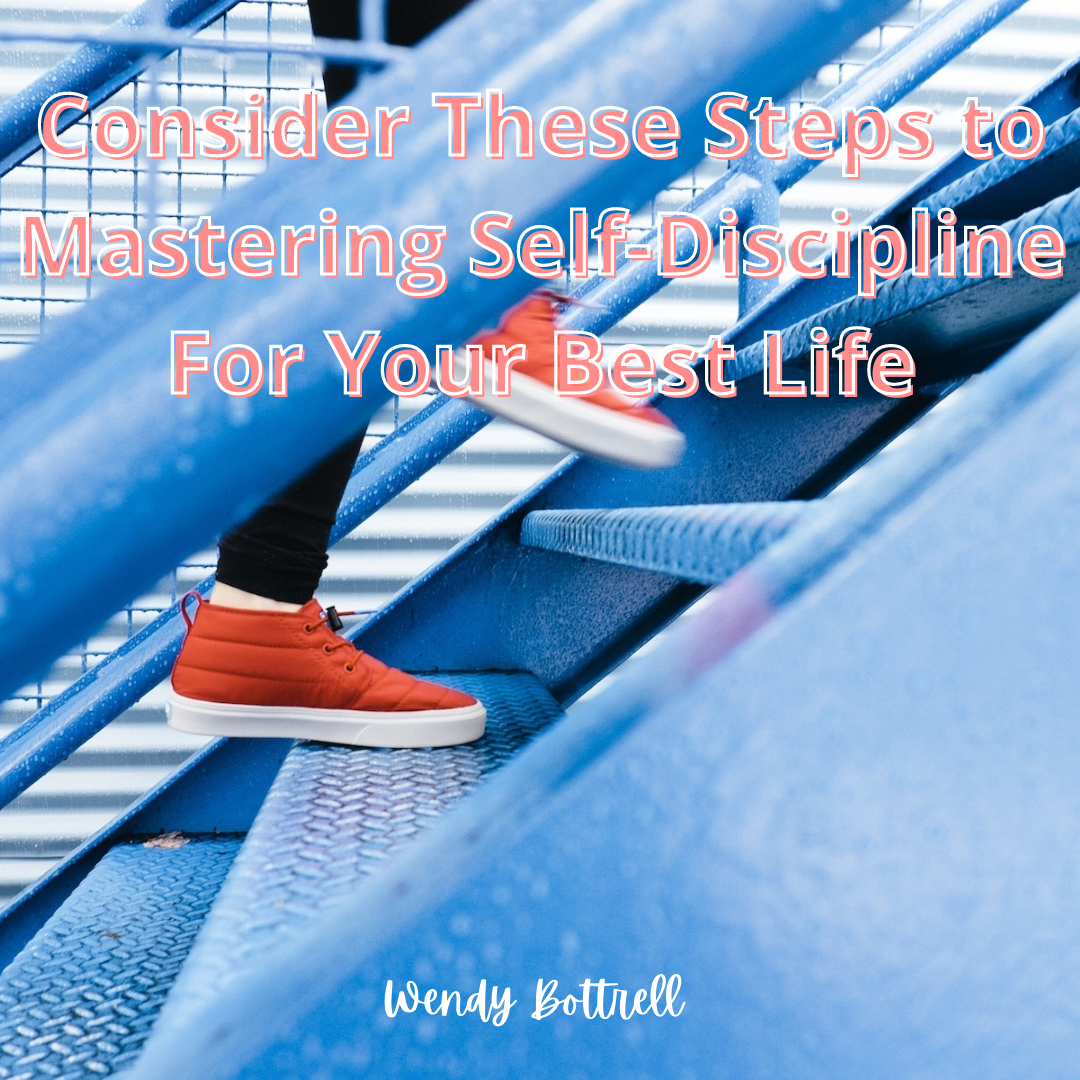 As we discuss and share ideas on Self-Discipline this month today we want to ask you to consider these steps to mastering self-discipline for your best life. You see we believe that anyone can master self-discipline if they really want to. Even in the process of practicing to develop more self-discipline, it will make a huge difference in your life. You learn to control your impulses, desires, and wants so that you can stay focused on achieving your long-term goals. Let’s check out eight steps to mastering self-discipline that you can start using today. 1. Know What Self-Discipline Is Definition - “Self-discipline is the ability to control yourself and to make yourself work hard or behave in a particular way without needing anyone else to tell you what to do. Exercising at home alone requires a tremendous amount of self-discipline.” - https://www.collinsdictionary.com/.../eng.../self-discipline Sometimes it’s hard to become self-disciplined for people because they don’t know what it means. They think it’ll take away all the fun from their life. On the contrary, all being self-disciplined means is that you don’t allow distractions or short-term temptations or desires to get in the way of reaching your long-term goals, dreams and desires. In fact, I believe that self-discipline allows for freedom in life because of the clarity on the goals I really want, I know my why and these things get done each and every day. All the things I don’t really want stop cluttering up my day. 2. Set Clear Goals To be successful in anything in life, you must have a clear WHY for doing it. We wrote about this here - https://wendybottrell.weebly.com/.../what-motivates... Your WHY, in this case, are bigger than your goals. Perhaps you want to start exercising every day? Maybe you need a process to finish a work project? Whatever it is, create the goal using a very specific language. Your goals - the results you are looking for, will be your why and your inspiration and motivation going forward. We wrote about using motivation to create your habits here - https://wendybottrell.weebly.com/.../stay-motivated-by... We wrote about creating fitness goals here - https://wendybottrell.weebly.com/.../three-solid-tips-to... 3. Know How to Achieve Your Goals Once you have a clear WHY and begin to set a goal, write down exactly how you’re going to achieve it. Write down every single step it will take for each goal that you’ve set, then put it in your calendar. Schedule it as if you’re going to do it and schedule it realistically. Keep in mind how long things really take and give yourself enough time - as well as a cushion. I produced a video where I flip the whole paradigm of goal setting on its head and look at goal setting from a different angle. You can check that video out here - https://youtu.be/ELOqFZPb-fc 4. Know Your Weaknesses If there is something that will distract you, now is the time to admit it. For example, if you want to get up an hour earlier each morning so that you can go to the gym before work, but you never can fall asleep before midnight, why not practice going to bed earlier. How you ask? Each night begin to get ready for bed a minute earlier on a consistent basis and very soon you will be going to bed at a time that will allow you to get up at a time that will allow you to go to the gym or exercise in the morning. Until then begin to exercise at a different time so that your goal is achievable. 5. Learn How to Prioritize The other thing you really need to practice and learn to be good at when mastering self-discipline is how to put things in the right order so that there are no bottlenecks. It’s sort of like realizing that your toothbrush should be in your bathroom so that you don’t forget to brush your teeth. Things must fit together simply. This takes practice, as well as trial and error. 6. Track Everything To get better at self-discipline you’ll need to track everything. That’s the only way you know if you’re doing better or not. Get a journal of some kind (the kind you’ll use is the best kind) and write it in each day to record your progress and feelings about various situations. 7. Get Accountability One thing about self-discipline is that eventually, you need to be able to provide accountability to yourself. For now, you might want to find a support group or a friend to talk to about your self-improvement goals so that you can work together. 8. Improve As you track and measure your progress and are accountable for your promises (to yourself and others), you can find areas where you can make improvements. Self-discipline is something you get better at with practice. Truly mastering self-discipline is mostly about understanding what it is, what it means, and the benefits of doing it, and then practicing it – every day. You may not be perfect but the more you succeed, the stronger you will become and the better you’ll be at being self-disciplined in the healthiest way. Share any thoughts in the comments below. Be sure to get in touch with us and let us know how we can help you. Subscribe to our newsletter here https://mailchi.mp/d44da570a49b/newslettercontent The Benefits Of Self-Discipline We are discussing self-discipline this month and now more than ever we feel it is an important topic for your health and fitness. Today's topic is How Self-Discipline Benefits Your Health & Fitness. Hopefully, self-discipline is something you learned as a kid growing up. We believe that self-discipline is one of the most vital skills you were taught. If you have learned this lesson, you’ll reap the benefits your entire life by reaching for and meeting your goals more easily. Here are some of the benefits of a self-disciplined life: 1. You Won’t Be Impulsive When you are able to control your own impulses, you tend to make much better decisions because you’re willing to stop and think before doing so. That means you’ll have fewer things to be sorry about when it comes to your health and fitness. You won’t skip your workouts; you won’t quit because you don’t see immediate results; you will make better food choices and you will get things done because you won’t create unneeded drama caused by impulsiveness. 2. You Know Your Priorities A self-disciplined person is very aware of the priorities they have each day. They are prepared and look over everything in plenty of time to arrange their day to meet those priorities. We believe this makes life way less stressful because discipline helps you to stay on track and practice creating powerful habits. 3. You Will Meet Your Obligations or Goals Let’s be clear. Meeting obligations and your goals feel good. It’s not a downer or a drag on your life. When you follow through and do something for your health and fitness (or life) that is important, it feels good, and you want to do it again. 4. Reduces Procrastination Procrastination is really a symptom of a larger problem - usually a lack of clarity in goals or a lack of confidence in skills, imposter syndrome, or fear of success. When you have self-discipline, you achieve your desired outcomes because of the clarity in knowing what you must do for your day. Be it making the desired food choices for your long-term goals, getting in the workout for the day. 5. You Don’t Need Passion to Finish Projects One of the biggest myths of life is that you should work or do things when you feel like it. When passion strikes it is the time to work out according to many. However, this is not a good plan. You’re not going to feel passion every single day. When you have self-discipline, you tend to get it done regardless of your thoughts and feelings. This is what I have experienced and the thing I know for sure is once I get that workout done, I feel good for two reasons: 1. I didn’t let myself down and 2. I achieved my goal for the day and this practice helps me get closer to the bigger long-term fitness and health goals I have planned. 6. You’ll Be Much Healthier If you follow the ideas we have already shared then your health and fitness will move forward no matter what. Due to not eating everything you see, not avoiding exercise, and working hard instead of avoiding the work (which is actually stressful), you’re going to be much healthier. You’ll feel better physically and mentally because you’re making better choices. 7. You’ll Sleep Better We shared the importance of sleep last month. When you get up at the same time each day, go to bed at the same time each night, and eat right most days - as well as do what you say you’ll do - you’ll sleep a lot better every night. 8. You’ll Feel Less Guilt When you follow through in life - whether it’s something you promised to yourself or someone else, you feel less guilt. You won’t have any reason to feel guilty due to your good choices. I feel this is one of the biggest issues we face today. We don’t practice the follow-through. By not doing the things you tell yourself it simply sets up bad thoughts. When you have self-discipline, it doesn’t mean that you aren’t a fun person or that you can't be spontaneous. It simply means that you are reliant on yourself, trust yourself, and show this by doing what you promise yourself and others that you will do. Share any thoughts in the comments. Be sure to get in touch with us and let us know how we can help you. Subscribe to our newsletter here Examples of Good Self-Discipline Last month we shared ideas to help you to focus on and improve your sleep. You can find those sleep ideas here https://bit.ly/3pCvmN5 In the month of March we are sharing ideas to help you with developing new habits and self-discipline. Today’s idea is our Best Examples of Good Self-Discipline For Your Best Life. Be sure to share your thoughts in the comments. I want to start out by sharing with you that my own self-discipline and good habits have been so important over the past year. With all that has gone on in 2020 and continues in 2021 so far staying on track has made a huge difference in me reaching so many goals. For example, I began the practice of intermittent fasting, reduced my coffee consumption, got outdoors, and walked almost every day, reduced my weight by 45 lbs. and I am in better shape now than when 2020 started. The year when it came to my health and fitness goals are concerned was easy. So, let’s get into the idea of self-discipline. It is our opinion that to be self-disciplined, you need to be able to create a vision for yourself to meet the goals that you set to achieve. You don’t need anyone’s outside help to get done what needs to get done. You do what you said you would - whether that was said to yourself or someone else, and even if you don’t feel like it. To get a bigger understanding of what self-discipline is, let’s look at some examples. Our ideas are not in any order of importance. 1. Wake Up on Time The ability to practice getting up at the time you decide to is self-discipline. Pushing the alarm to snooze multiple times sets your day up first thing for a letdown. You have not lived up to your plan and the simplest way to do this is with some self-discipline. It only takes a few mornings of that practice of getting up when you decide to use your self-discipline for the new habit to begin. Waking up on time is simply self-discipline that gets you going each day. For me, it is also about doing what I say I am going to do. This makes me excited about achieving the desired result. It feels good and I get the WIN which makes me want to achieve more. Allowing yourself to have a WIN to start the day sets you up for a great day. It takes practice and self-discipline. Enjoy the process of becoming self-disciplined and reap the rewards of creating new habits. 2. Eat Well – Cook Well We know today that consuming a diet of Frankenfoods, junk foods and highly processed foods is not a healthy choice and will not promote a healthy lifestyle. A person who chooses to eat a real organic food diet is demonstrating excellent self-discipline and has begun the habit of living a healthier lifestyle by saying no today to short-term pleasure that always comes with poor quality food in exchange for being healthier long term. The other important idea here is to build the habit of preparing your real food meals at home and eat at the kitchen or dining room table. Do you know many people have lost the art of home cooking? Here is a cookbook that we recommend. http://bit.ly/2NLLXOx 3. Daily Exercise I enjoy my daily practice of exercise. In fact, I schedule my fitness into my day and look forward to it. I walk each morning and lift weights or use kettlebells each afternoon as a part of my fitness habit. I know that many people tell themselves they don’t like exercise however it might be that they are not in the practice of doing some kind of exercise daily. You see the human body is meant to move however in our modern lifestyle we have simply forgotten this idea. A person who goes ahead and does their exercise anyway each day because they have goals is showing how self-disciplined they are. If you are not exercising at this moment it is as simple as beginning a walking program. 4. Create Good Habits Our goal this month is to help you realize that self-discipline is simply a way to create good habits. For example, a person who has the goal to get up an hour earlier to go to the gym knows that the self-discipline will only be for the first month, then after that, a habit will be created. Self-discipline doesn’t mean that a person never has fun. The ability to let go of weakness and do what you know is right is the best example of self-discipline. It doesn’t matter if it is for your work or wellbeing; practicing self-discipline for yourself is essential to your happiness and success in all areas of life. Share any thoughts in the comments below. Be sure to get in touch with us and let us know how we can help you. Subscribe to our newsletter here |
Archives
April 2024
Categories |










 RSS Feed
RSS Feed
